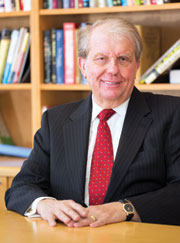 Call it a Hunch
Call it a Hunch
For the most part, I deal in the realm of the scientific. I've spent my career testing hypotheses to tease apart fact and fiction, and shepherding flocks of new researchers. But there are some things that you just know in your gut. I'm quite certain, for instance, that the human brain is the most complex thing in the universe. I know that chocolate ice cream has it all over vanilla any day of the week. And I know that excellence breeds excellence.
When I last wrote in these pages, George Washington University had been added to the top tier of research schools in the influential Carnegie Classifications of Institutions of Higher Education—a momentous shift for us, and the result of much determination and hard work. A year later, GW has joined the list of the nation's top 100 colleges and universities in terms of funding spent on research and development projects, as catalogued by the National Science Foundation.
We got there by vaulting, in a year, nearly three dozen spots. And the forward momentum is still gathering.
In the past year the research horizon at GW has continued to expand, physically and intellectually. Construction continues to reach skyward at the sites of both our Science and Engineering Hall and a new home for our School of Public Health and Health Services, the only such school in the nation's capital. And the university has launched the first in its slate of interdisciplinary research initiatives.
With these initiatives we're bringing to bear know-how from any number of disciplines in order to grapple with the expansive issues of our day. Part of that is pooling the expertise of our current faculty members, and part of it is recruiting top-notch leaders to build up new areas of research.
The latter includes two widely respected leaders who recently joined the university: biologist Keith Crandall, who has launched our new Computational Biology Institute, and Mary Ellsberg, the head of our new Global Women's Institute.
There's a strong education component to these initiatives, too. For example the Cybersecurity Initiative, launched in December and chaired by former U.S. Secretary of Homeland Security Michael Chertoff, comprises some new degree programs, including a Master of Science in Cybersecurity in Computer Science and a cybersecurity-focused track within a Doctor of Education in Human and Organizational Learning degree.
We're also bringing this approach to urban food studies, a topic that runs through just about any aspect of life and scholarship, from biology to sustainability to diplomacy—you name it. It's a charge that acclaimed chef José Andrés is now helping us lead, both as a member of GW's Urban Food Task Force and as the anchor of a new course, "The World on a Plate: How Food Shapes Civilization."
What's created by all this is momentum that can't be measured, moving in a direction that would be hard to chart on any map. It is palpable, though, and it's driving forward.
Sincerely,
Leo Chalupa
Vice President for Research
